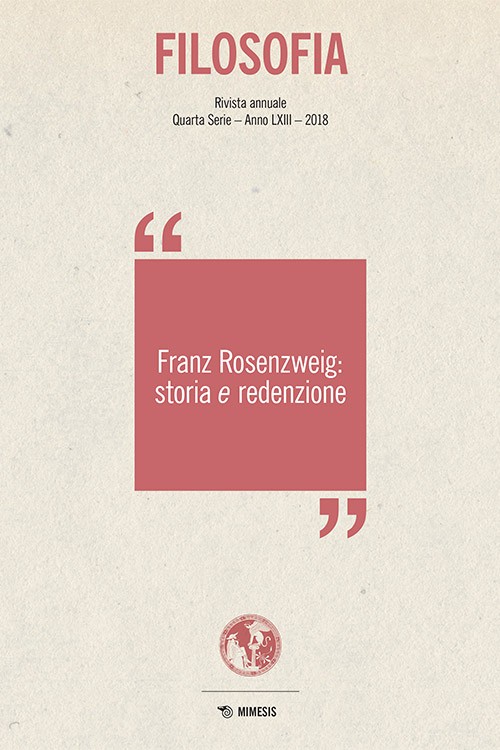La congiunzione “e” nei processi di riconciliazione. Riflessioni alla luce della filosofia di Franz Rosenzweig
DOI:
https://doi.org/10.13135/2704-8195/3798Parole chiave:
reconciliation, otherness, reparation, dialogueAbstract
Reconciliation presents three dimensions in which the conjunction “and” – as Rosenzweig conceives it – constitutes a fundamental category: on one hand, it has a temporal dimension, as it is a process in which the old and the new are combined, and where the “and” expresses the present that unites; on the other hand, it has a dimension of otherness as a relationship between an “I” and an “other”, a relationship where the “and” is the language. Finally, there is in reconciliation a dimension of reparation (tikkun olam) or return to the alliance with the Good, that is expressed in a peace (shalom) that is the fulfilling of the divine promise: that of the peace between the man “and” the world. God is the “and” that fulfils the aspiration to mundane happiness “and” human fullness. These three dimensions, analysed in the light of Rosenzweig’s thought, introduce new keys to the reconciliation process that today constitute an urgent task.
Downloads
Riferimenti bibliografici
M. Alonso, Un repudio que se hace esperar. El terrorismo de ETA y la verdad de la víctima, in Las víctimas como precio necesario, a cura di J. A. Zamora, R. Mate e J. Maiso, Madrid, Trotta, 2016.
H. Arendt, On Revolution, New York, Penguin, 1963.
A. Baer, N. Sznaider, Los desaparecidos del Holocausto español. Memorias transnacionales y políticas del Nunca más, in Las víctimas como precio necesario, a cura di J. A. Zamora, R. Mate e J. Maiso, Madrid, Trotta, 2016.
E. Crenzel, De la verdad jurídica al conocimiento histórico: la desaparición de personas en la Argentina, in Lesa humanidad. Argentina y Sudáfrica: reflexiones después del Mal, a cura di C. Hilb, P.-J. Salazar e L. G. Martín, Buenos Aires, Katz, 2014.
J. Derrida, Adieu à Emmanuel Lévinas, Paris, Galilée, 1997.
D. Galcerá, Primo Levi: la violencia de la zona gris, e R. Mate, Violencia del terrorismo y superación de la violencia, in Las víctimas como precio necesario a cura di J. A. Zamora, R. Mate e J. Maiso, Madrid, Trotta, 2016.
C. Hilb, Justicia, reconciliación, perdón. Cómo fundar una comunidad después del crimen, in Lesa humanidad. Argentina y Sudáfrica: reflexiones después del Mal, a cura di C. Hilb, P.-J. Salazar e L. G. Martín, Buenos Aires, Katz, 2014.
P. Lanceros, Orden sagrado, santa violencia. Teotecnologías del poder, Madrid, Adaba, 2014.
I. Kertész, A kudarc (Fiasco), Budapest, Magvető, 1988.
M. Rosàs Tosas, Mesianismo en la filosofía contemporánea. De Benjamin a Derrida, Barcelona, Herder, 2016.
F. Rosenzweig, Neuorientierung, in Idem, Der Mensch und sein Werk. Gesammelte Schriften III, Zweistromland. Kleinere Schriften zu Glauben und Denken, a cura di R. e A. Mayer, Dordrecht-Boston-Lancaster, Martinus Nijhoff, 1984.
F. Rosenzweig, La stella della redenzione (1921), tr. it. a cura di G. Bonola, Casale Monferrato, Marietti, 1985.
F. Rosenzweig, Dell’intelletto comune sano e malato (1964), tr. it. a cura di G. Bonola, Reverdito, Trento, 1987.
F. Rosenzweig, Il nuovo pensiero. Alcune note supplementari a La stella della redenzione (1925), tr. it. di G. Bonola, in Idem, La Scrittura. Saggi dal 1914 al 1929, a cura di G. Bonola, Roma, Città Nuova, 1991, pp. 257-282.
F. Rosenzweig, La scienza di Dio (1984), in Idem, Dio, uomo e mondo, tr. it. a cura di R. Bertoldi, Firenze, Giuntina, 2013.
A. Sucasas, Fenomenología de lo inmundo: Imre Kertész y la memoria de Auschwitz, in Las víctimas como precio necesario, a cura di J. A. Zamora, R. Mate e J. Maiso, Madrid, Trotta, 2016.
V. von Weizsäcker, Anonyma, Bern, A. Francke, 1946.
R. Wiehl, Die Erfahrung im neuen Denken von Franz Rosenzweig (1982), in Idem, Metaphysik und Erfahrung. Philosophische Essays, Frankfurt am Main, Suhrkamp, 1996.
##submission.downloads##
Pubblicato
Come citare
Fascicolo
Sezione
Licenza
Filosofia applica una licenza Creative Commons Attribution 4.0 International License a tutto il materiale pubblicato.




